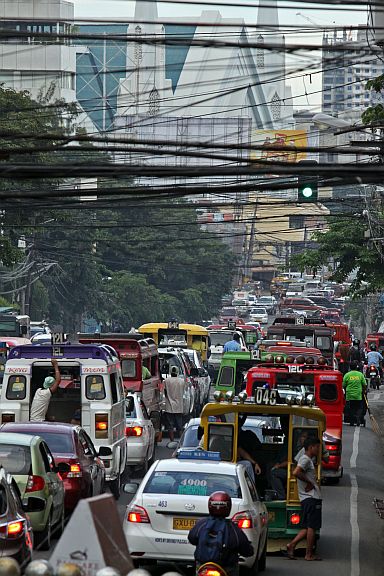
TRAFFIC WOES: Traffic congestion continues to be a major concern in Cebu City and the rest of Metro Cebu for a good number of years as shown in this photo of General Maxilom Ave., Cebu City, during an afternoon rush hour taken in 2013.
(CDN FILE PHOTO)
OFFICIALS and private sector leaders in Cebu have opposed a proposal to cede local governments’ road management authority to Transportation Secretary Arthur Tugade, who is being eyed as traffic czar, under a bill that seeks to grant emergency powers to the executive branch to solve road chaos in highly urbanized areas.
While Cebu officials agreed that emergency powers could help address road chaos in the country’s most highly urbanized areas, they also believed that local government units (LGUs) need to be involved in finding solutions.
Lawyer Rafael Yap, head of the Cebu City Traffic Office (CCTO), said emergency powers can help provide short-term solutions and pave the way for medium- and long-term plans.
But Yap said, “Traffic is a local problem.”
“Cities and provinces are the best agencies to address congestion since were are accountable to our constituents every time they get stuck in traffic,” Yap said.
He said since city development is closely tied to traffic, the city should also be the one to address road congestion. But city governments have all the responsibility but none of the resources of the national government, he said.
He said if LGUs would cede traffic management roles to the Department of Transportation (DOTr), it would require the creation of new metropolitan authority offices in each LGU that loses its traffic management powers to the department.
Giving priority to opening new roads, rather than repairing existing ones, should be the thrust if the national government takes over the LGU function in traffic management.
He said traffic enforcement systems should also be fixed, adding there should be a system of penalty for erring motorists who “take the best of both worlds.”
The penalty, he said, should be “enforceable and harsh enough to have an impact.”
Establishing traffic courts would also help, he added.
For Mandaue Chamber of Commerce and Industry (MCCI) past president Philip Tan, the root cause of Metro Cebu’s road congestion is the lack of discipline among motorists.
Another is the failure of road networks to catch up with the increase in the number of vehicles.
Tan said he did not think it would be necessary for the President’s emergency powers to be used in the city since the local government has its own traffic management system.
Even the President’s emergency powers would not have an impact if motorists are undisciplined, he added.
Tan said while emergency powers could lead to more infrastructure projects, the number of cars on the road is also expected to continue growing.
Ted Locson Jr., head of the external affairs committee of the Cebu Chamber of Commerce and Industry (CCCI), said he would prefer LGUs to handle traffic management because they are closer to where the action is.
“It’s just that (LGUs) refuse or lack the will to implement solutions that have been recommended by experts,” said Locson.
The Land Transportation Office, he said, should also consider the phase out of vehicles that are over 10 years old.
At least four lawmakers — Representatives Rodolfo Albano III of Isabela, Harry Roque of Kabayan party-list, Alfredo Garbin Jr. of Ako Bicol party-list and Lito Atienza of Buhay party-list — have opposed granting the President broad emergency powers, saying that DOTr should not be given a blanket authority to “shake up” offices and LGUs.